|
|
|
Sort Order |
|
|
|
Items / Page
|
|
|
|
|
|
|
| Srl | Item |
| 1 |
ID:
132102
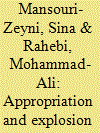

|
|
|
|
|
| Publication |
2014.
|
| Summary/Abstract |
The two of us wrote Anti-Oedipus together. Since each of us was several, there was already quite a crowd.
-Deleuze and Guattari, A Thousand Plateaus
With the linguistic turn came an ever-increasing tendency to see language as the locus where truths are born, passed along, or modified. As such, postmodern theories have proved highly compatible with postcolonial studies, which have inspired studies of modern Iran as a country that was colonized, only not officially. However, the latter seem to have fallen for extreme abstraction where metaphysical claims abound: presuming constructivist views of language but failing to present a tangible framework, these studies discuss "discursive change" without giving a clue as to what either discourse or change is. Convinced as such, we have adopted Wittgenstein's idea of language-games to present a tangible model for discursive change.
|
|
|
|
|
|
|
|
|
|
|
|
|
|
|
|
| 2 |
ID:
180027


|
|
|
|
|
| Summary/Abstract |
In multilingual Iran, Persian continues to be perceived as the official language, while other languages are regarded as local. The duality is not confined to linguistic realms, and extends into the purview of culture. Terms such as ‘local music’, ‘local dance’ or ‘local dialects’ and, with the same token, ‘official language’ and ‘official religion’, for example, refer to much wider and deeper social relations or cultural positions. They are the sources of the production and perpetuation of meanings, to borrow from Bourdieu, which safeguard the interest of a social group or class, and determine the performance of the producers of knowledge, for example writers, without their being directly part of the dominant group.
|
|
|
|
|
|
|
|
|
|
|
|
|
|
|
|
| 3 |
ID:
110878
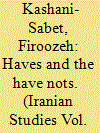

|
|
|
|
|
| Publication |
2010.
|
| Summary/Abstract |
This essay provides a historical analysis of Iranian experiences with disability. I will begin by reviewing the literary application of the term in various contexts. Next, I will examine the social milieux in which local observers, medical professionals, and policy makers talked about and treated disability. As state-run institutions emerged to address disability needs, health professionals often drew a distinction between physical disability and intellectual or psychological disability, raising ethical and legal questions about the status of the disabled in modern Iranian society. Finally, an attempt will be made to situate disability politics in contemporary Iran, where the disabled population has increased significantly as a consequence of the Iran-Iraq War (1980-88). Although this paper concentrates on Iranian experiences with disability, comparisons can be drawn with other Islamic societies.
|
|
|
|
|
|
|
|
|
|
|
|
|
|
|
|
| 4 |
ID:
108752
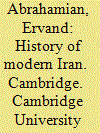

|
|
|
|
|
| Publication |
Cambridge, Cambridge University Press, 2008.
|
| Description |
xxviii, 228p.
|
| Standard Number |
9780521821391
|
|
|
|
|
|
|
|
|
|
|
|
Copies: C:1/I:0,R:0,Q:0
Circulation
| Accession# | Call# | Current Location | Status | Policy | Location |
| 056391 | 955.05/ABR 056391 | Main | On Shelf | General | |
|
|
|
|
| 5 |
ID:
168625
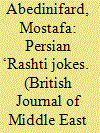

|
|
|
|
|
| Summary/Abstract |
For almost a century, a Persian ethnic joke cycle has circulated among Iranians about the men and women of the northern Iranian city of Rasht, labelling them as cuckolds and promiscuous women. A foray into the historical background and possible (gendered) functions of these jokes is long overdue. I argue that the central motif of Rashti jokes is gheyrat—a gendered social construct based on a man’s sense of honour, possessiveness and protectiveness towards certain female kin—which remains pivotal to our understanding of the texts and the historical context of the jokes. Critically reviewing extant theories on the historical origins of Rashti jokes, I argue they have roots in two modern phenomena: (a) debates among turn-of-the-twentieth-century Iranian thinkers over women’s (un)veiling; and (b) Reza Shah’s methodical promotion of an Aryanist, pan-Persian ideology. Focusing on the gender-disciplinary functions of the jokes, I then show how some contemporary Rashti jokes are deployed to project and inscribe gender-hierarchical notions that clearly surpass the jokes’ immediate, ethnic targets by commenting on broad socio-political topics. Such instances suggest that as a culture-wide joke cycle, Rashti jokes may also reinforce a form of Iranian masculinity obsessed with gheyrat-motivated control and aggression.
|
|
|
|
|
|
|
|
|
|
|
|
|
|
|
|
| 6 |
ID:
178777
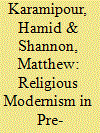

|
|
|
|
|
| Summary/Abstract |
The advent of “modern” education in Iran and its acceptance by political and cultural elites dates to the Qajar era. But the elitist nature of state reforms prevented modern education from spreading throughout society until the Pahlavi era. Especially during the reign of Mohammad Reza Shah Pahlavi, modern education reached most segments of the population, including religious families from the middle classes. This research is based on Persian-language documents and informed by the English-language historiography. The article finds that the Islamic Education Society (Jāmeʿeh-ye taʿlimat-e eslāmi) propagated religious modernism through a national network of private schools beginning in the 1940s. In the 1950s and 1960s private cultural foundations used the Islamic Education Society’s model to establish the Alavi, Kamāl, and Refāh schools in Tehran. The network that supported them was a reflection of the revolutionary movement and a vehicle for its organization by the 1970s.
|
|
|
|
|
|
|
|
|
|
|
|
|
|
|
|
| 7 |
ID:
046553
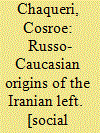

|
|
|
|
|
| Publication |
Richmond, Curzon Press, 2001.
|
| Description |
352p.hbk
|
| Series |
Caucasus World
|
| Standard Number |
0700714073
|
|
|
|
|
|
|
|
|
|
|
|
Copies: C:1/I:0,R:0,Q:0
Circulation
| Accession# | Call# | Current Location | Status | Policy | Location |
| 045022 | 955/CHA 045022 | Main | On Shelf | General | |
|
|
|
|
| 8 |
ID:
102703


|
|
|
|
|
| Publication |
2011.
|
| Summary/Abstract |
In the shop-lease contract with sar-qofli, which is a widely practiced form of lease contract in today's Iran, a lessor of a shop sells to a hirer a right called sar-qofli which amounts to almost as much as the entire value of the shop's ownership, while obtaining a monthly rent of only small value. This peculiar form of contract was brought into existence based on a new right called "haqq-e kasb o pishe o tejarat," that emerged as a result of the blending of traditional customary practice relating to real estate leasing with Anglo-American value concepts. The adoption of this right, causing as it did the lessor's responsibility for compensation for the value of the usufructuary right, drastically changed the relationship between lessors and hirers in Iran.
|
|
|
|
|
|
|
|
|
|
|
|
|
|
|
|
|
|
|
|
|